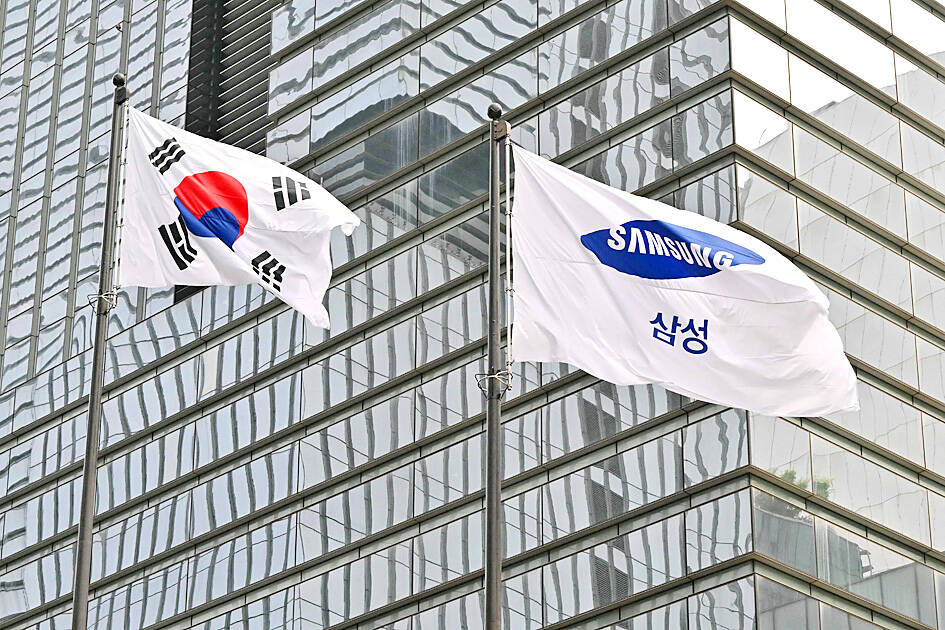South Korea would set up an aid package worth more than US$7 billion to support its chip industry, the South Korean Ministry of Economy and Finance said yesterday.
This initiative follows its pledge last year to build the world’s largest chip center using US$240 billion of private investment, primarily from Samsung Electronics Co, the world’s largest memorychip maker, as it seeks an edge in the global industry.
Seoul “is preparing an assistance package of more than 10 trillion won (US$7.3 billion) to support fabless, chips materials and manufacturing equipment in all areas of chips industry,” South Korean Minister of Economy and Finance Choi Sang-mok said in a ministry statement.

Photo: AFP
INVESTMENT
The US$7.2 billion package could be created through “a new fund financed by private and public financial institutions,” Choi told executives of domestic chipmakers at a meeting on Friday the statement said.
It comes as Asia’s fourth-largest economy aims to invest heavily in six key technologies including chips, displays and batteries, all areas where the country’s tech giants are well-established already.
South Korea is home to two of the world’s largest memorychip makers: Samsung Electronics and SK Hynix Inc.
Semiconductors are Seoul’s leading export and hit US$11.7 billion in March, their highest level in almost two years, accounting for one-fifth of South Korea’s total exports, according to figures released by the South Korean Ministry of Trade, Industry and Energy.
CRITICAL ISSUE
In May 2022, Samsung announced a 450 trillion won investment blueprint over the next five years aimed at making it a frontrunner in key sectors from semiconductors to biologics.
Securing supplies of advanced chips has become a crucial issue internationally, with the US and China locked in a fierce battle for control of the chips market.
Washington is pressing allies including South Korea to further tighten restrictions on China’s access to semiconductor technology. US officials also want South Korea to restrict the flow of equipment and technologies for making high-end logic and memory chips to China, Bloomberg News has reported.

Intel Corp chief executive officer Lip-Bu Tan (陳立武) is expected to meet with Taiwanese suppliers next month in conjunction with the opening of the Computex Taipei trade show, supply chain sources said on Monday. The visit, the first for Tan to Taiwan since assuming his new post last month, would be aimed at enhancing Intel’s ties with suppliers in Taiwan as he attempts to help turn around the struggling US chipmaker, the sources said. Tan is to hold a banquet to celebrate Intel’s 40-year presence in Taiwan before Computex opens on May 20 and invite dozens of Taiwanese suppliers to exchange views

Application-specific integrated circuit designer Faraday Technology Corp (智原) yesterday said that although revenue this quarter would decline 30 percent from last quarter, it retained its full-year forecast of revenue growth of 100 percent. The company attributed the quarterly drop to a slowdown in customers’ production of chips using Faraday’s advanced packaging technology. The company is still confident about its revenue growth this year, given its strong “design-win” — or the projects it won to help customers design their chips, Faraday president Steve Wang (王國雍) told an online earnings conference. “The design-win this year is better than we expected. We believe we will win

Power supply and electronic components maker Delta Electronics Inc (台達電) yesterday said it plans to ship its new 1 megawatt charging systems for electric trucks and buses in the first half of next year at the earliest. The new charging piles, which deliver up to 1 megawatt of charging power, are designed for heavy-duty electric vehicles, and support a maximum current of 1,500 amperes and output of 1,250 volts, Delta said in a news release. “If everything goes smoothly, we could begin shipping those new charging systems as early as in the first half of next year,” a company official said. The new

Quanta Computer Inc (廣達) chairman Barry Lam (林百里) is expected to share his views about the artificial intelligence (AI) industry’s prospects during his speech at the company’s 37th anniversary ceremony, as AI servers have become a new growth engine for the equipment manufacturing service provider. Lam’s speech is much anticipated, as Quanta has risen as one of the world’s major AI server suppliers. The company reported a 30 percent year-on-year growth in consolidated revenue to NT$1.41 trillion (US$43.35 billion) last year, thanks to fast-growing demand for servers, especially those with AI capabilities. The company told investors in November last year that